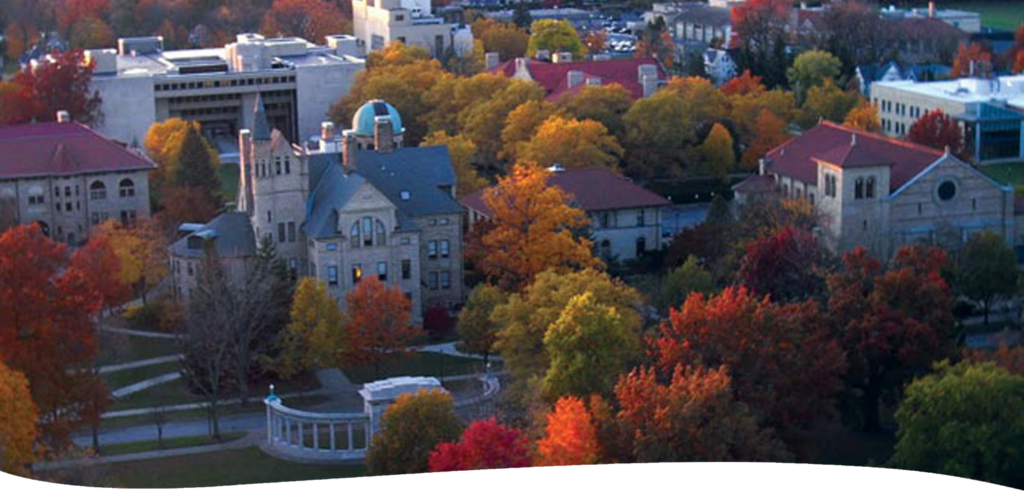
Carbon Neutrality at Oberlin College
In March of this year, Oberlin College and Conservatory announced that they have reached the milestone of carbon neutrality by their 2025 target. To achieve this ambitious goal, the College implemented the Sustainable Infrastructure Program, a four-year construction project that included replacing fossil fuels with geothermal energy as the source of heating and cooling for campus buildings; and upgrading the century-old heating system to a more efficient hot water system. The new district energy system provides low-temperature hot water and chilled water for space heating, space cooling, and domestic hot water. This work doubled the number of residence hall rooms that have air conditioning, while also making building improvements that increase campus efficiency and student and faculty comfort year-round.
Study and Planning
Ever-Green’s 2016 study concluded that there were several carbon-free strategies that could help Oberlin achieve its goal. Geothermal was identified as the preferred strategy to reduce the carbon profile of the campus’ thermal load, although biomass, biogas, and waste heat recovery from an adjacent landfill were also determined to be financially feasible and implementable.
Implementation
In March 2020, trustees approved a plan to convert the campus to a low-temperature energy system that uses a single source of heating and cooling for most campus buildings. Ever-Green began leading the implementation of the program with an emphasis on converting the campus from steam to hot water, expanding the chilled water system on campus, installing a comprehensive fiber network, expanding fire protection systems, upgrading electrical systems, and modernizing campus buildings. Construction occurred over four years with work concentrated during the summer of each year to limit disruption.
The project had three main components:
Production: Installation of 850 geothermal wells as the primary source of heating and cooling across campus. Water-source heat pumps, powered by renewable electricity from the City of Oberlin’s nonprofit electric utility, extract heat from the wells in winter for heating and reject heat to the wells in summer for cooling.
Distribution: Replacement of deteriorating steam and chilled water pipes with new hot water and chilled water pipes. The distribution network connects the central plant to campus buildings. There are also underground distribution pipes that connect the geothermal field to the central plant.
Building Mechanical Systems: Retrofitting 56 campus buildings (90%) to accommodate the new energy system and equipping 11 more buildings with air conditioning (24 total buildings with cooling; including approximately 980 student beds).
Ever-Green’s Role
Ever-Green Energy has been a partner to Oberlin College since 2015. Ever-Green led the Carbon Neutrality Implementation Plan (2016) for the Oberlin campus with an emphasis on energy and water utilities and led implementation of the planning recommendations, which include design of the campus conversion from steam to hot water, verification of the optimal carbon-free energy supply strategies, utility organizational planning, development of financing strategies, and engagement.
As Oberlin’s owner’s representative, Ever-Green led design and implementation of the overall SIP program through startup and commissioning and has operated the new energy systems since 2021. In 2022, Ever-Green also began operations and maintenance of the college’s solar PV including the 2.7 MW array on campus.
About the Client
Oberlin College is a four-year liberal arts college and conservatory of music with a reputation for leadership in campus sustainability. Oberlin’s Office of Environmental Sustainability takes a multidisciplinary approach to advancing sustainability for campus and community resilience.
From the Oberlin website:
“Since the first greenhouse gas inventory in 2007, the college has halved on-campus emissions through the purchase of green electricity, installation of a 2.27 MW solar array, energy efficiency projects, and ending the use of coal for heating.” Oberlin declared its campus carbon neutral in 2025.
Stakeholder Engagement
Stakeholder engagement has been a key feature of Oberlin’s program from planning through implementation. Throughout the study and planning phase, the Oberlin team worked closely with Ever-Green to solicit input from students, faculty, staff, and community partners, including the City of Oberlin, and local civic, business, and community groups. Through construction, Ever-Green supported community and campus forums, academic integration, intern management, tours, and project communications. Student interns gained real-world experience while providing project support in the areas of student energy education and GIS mapping.

